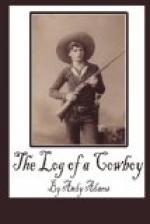Dragging the logs up to the place selected for the ford was an easy matter. They were light, and we did it with ropes from the pommels of our saddles, two to four horses being sufficient to handle any of the trees. When everything was ready, we ran the wagon out into two-foot water and built the raft under it. We had cut the dry logs from eighteen to twenty feet long, and now ran a tier of these under the wagon between the wheels. These we lashed securely to the axle, and even lashed one large log on the underside of the hub on the outside of the wheel. Then we cross-timbered under these, lashing everything securely to this outside guard log. Before we had finished the cross-timbering, it was necessary to take an anchor rope ashore for fear our wagon would float away. By the time we had succeeded in getting twenty-five dry cottonwood logs under our wagon, it was afloat. Half a dozen of us then swam the river on our horses, taking across the heaviest rope we had for a tow line. We threw the wagon tongue back and lashed it, and making fast to the wagon with one end of the tow rope, fastened our lariats to the other. With the remainder of our unused rope, we took a guy line from the wagon and snubbed it to a tree on the south bank. Everything being in readiness, the word was given, and as those on the south bank eased away, those on horseback on the other side gave the rowel to their horses, and our commissary floated across. The wagon floated so easily that McCann was ordered on to the raft to trim the weight when it struck the current. The current carried it slightly downstream, and when it lodged on the other side, those on the south bank fastened lariats to the guy rope; and with them pulling from that side and us from ours, it was soon brought opposite the landing and hauled into shallow water. Once the raft timber was unlashed and removed, the tongue was lowered, and from the pommels of six saddles the wagon was set high and dry on the north bank. There now only remained to bring up the cattle and swim them, which was an easy task and soon accomplished.
After putting the Salt Fork behind us, our spirits were again dampened, for it rained all the latter part of the night and until noon the next day. It was with considerable difficulty that McCann could keep his fire from drowning out while he was getting breakfast, and several of the outfit refused to eat at all. Flood knew it was useless to rally the boys, for a wet, hungry man is not to be jollied or reasoned with. Five days had now elapsed since we turned off the established trail, and half the time rain had been falling. Besides, our doubt as to where we were had been growing, so before we started that morning, Bull Durham very good-naturedly asked Flood if he had any idea where he was.




